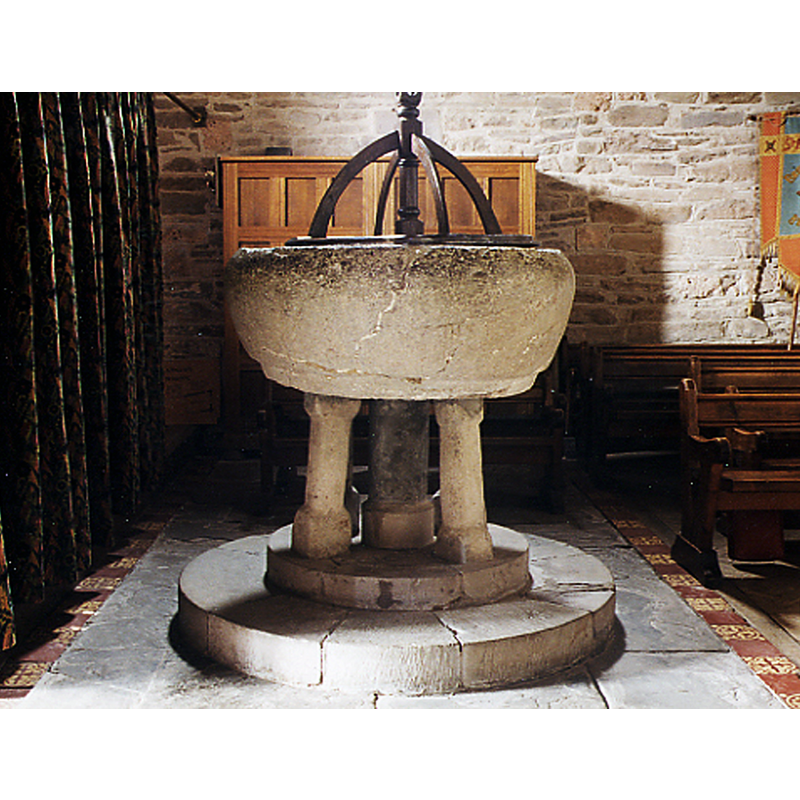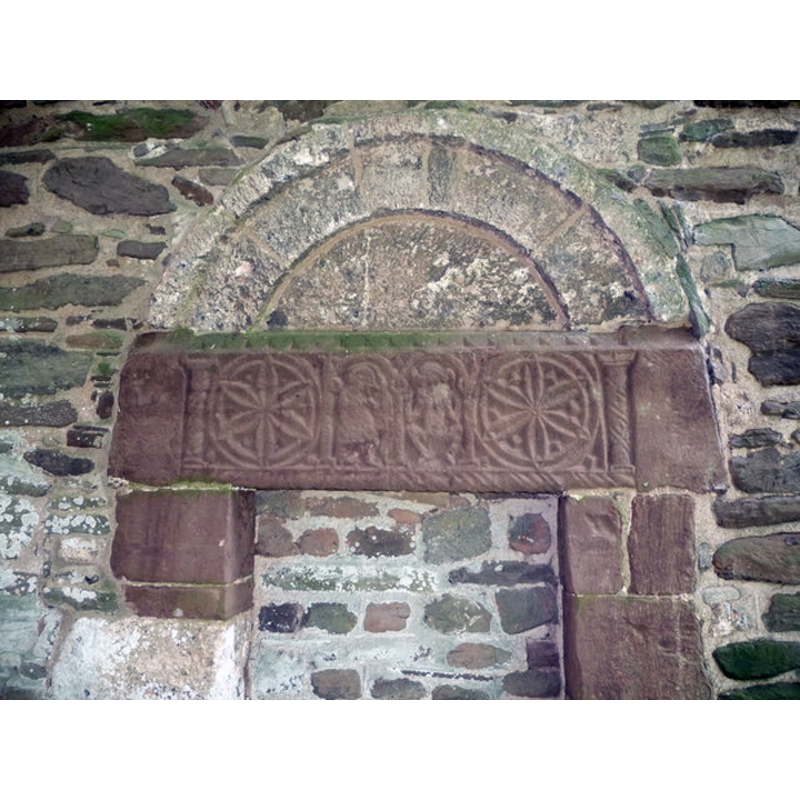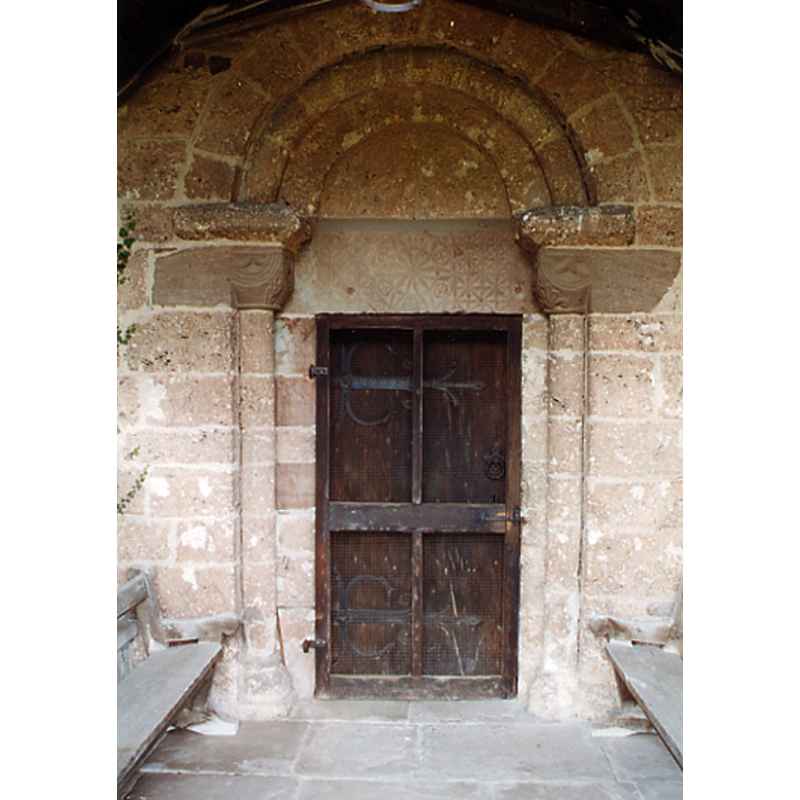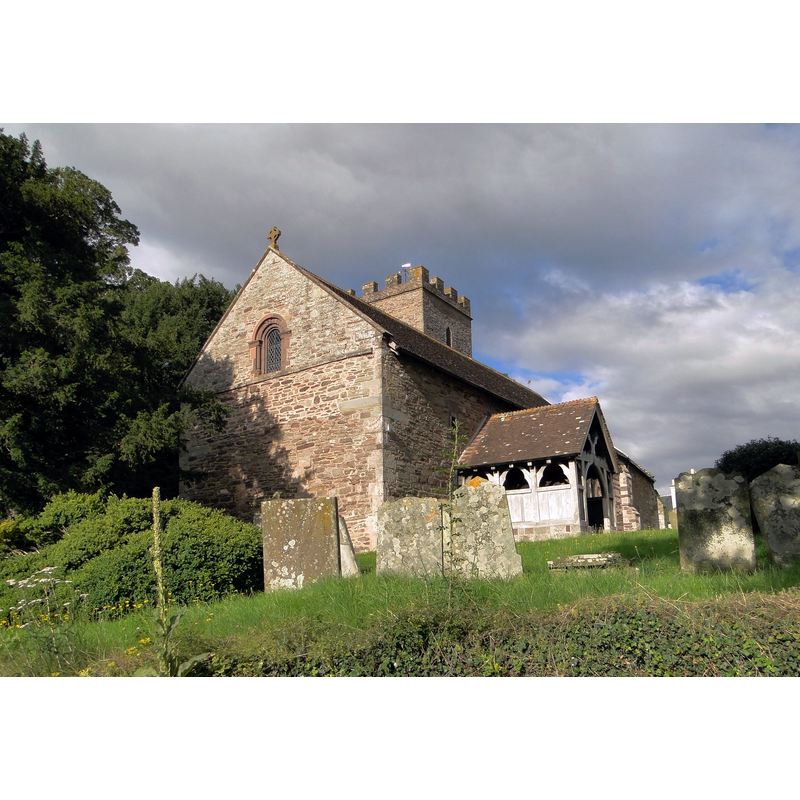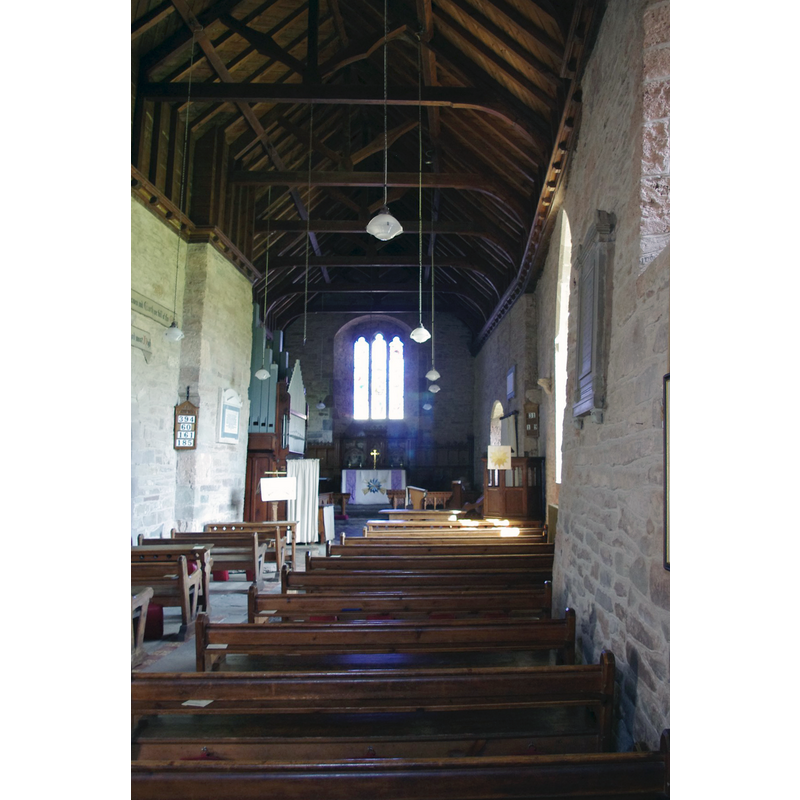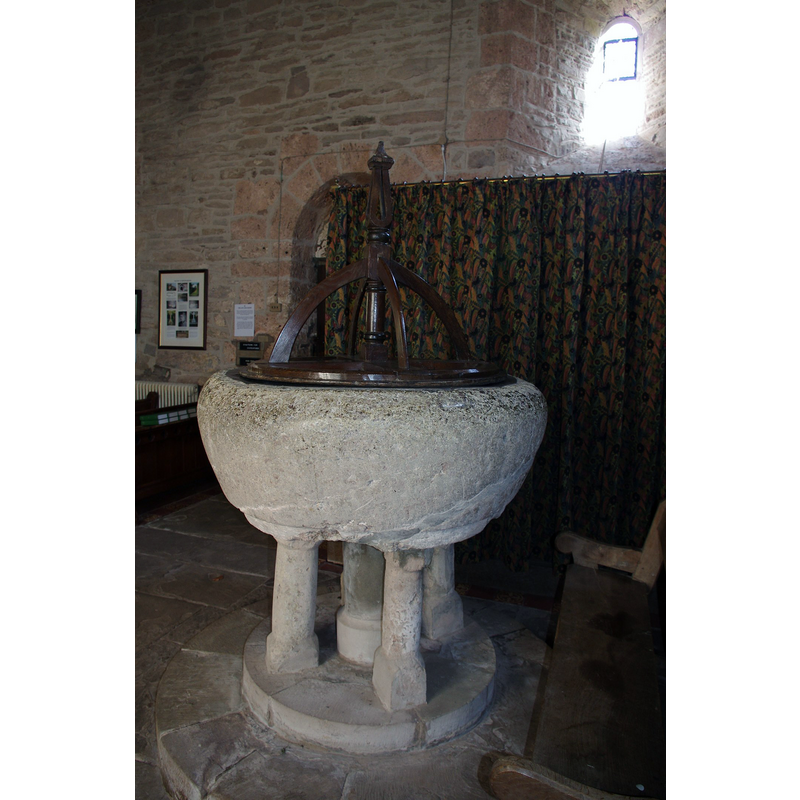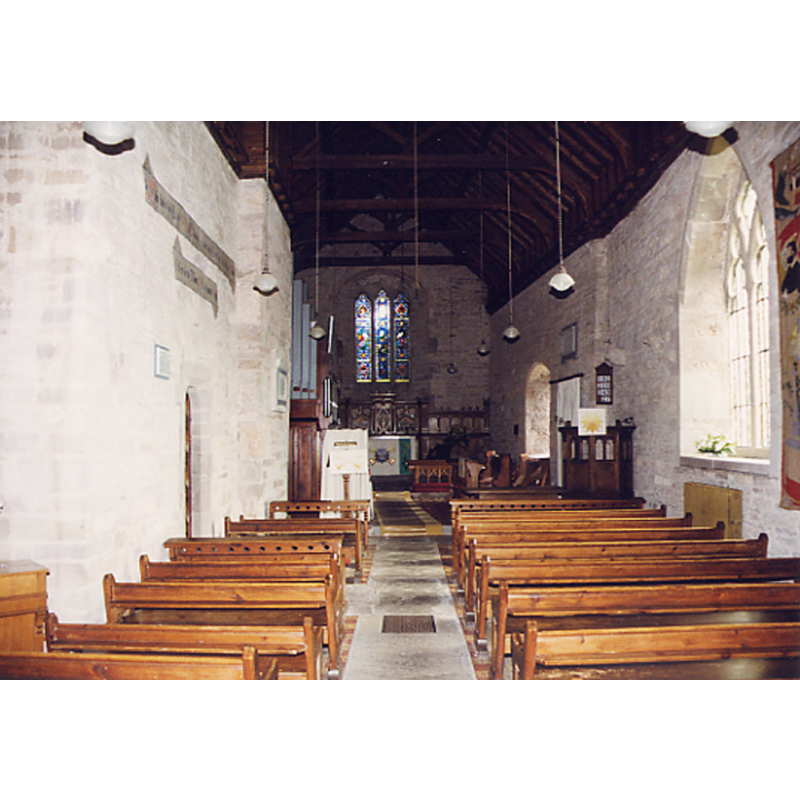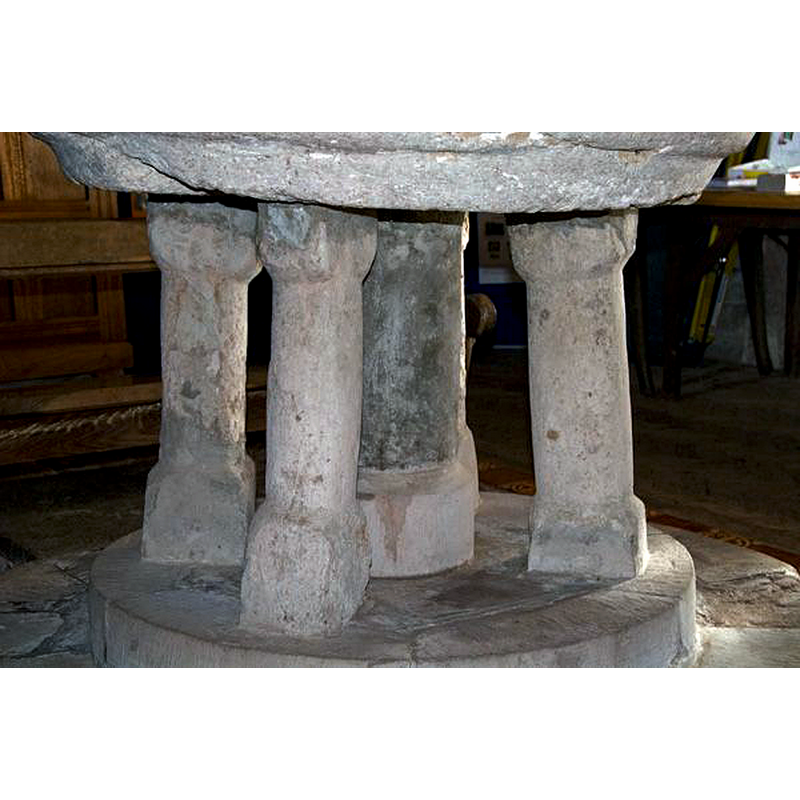Bredwardine / Bradwardine / Brocheurdie
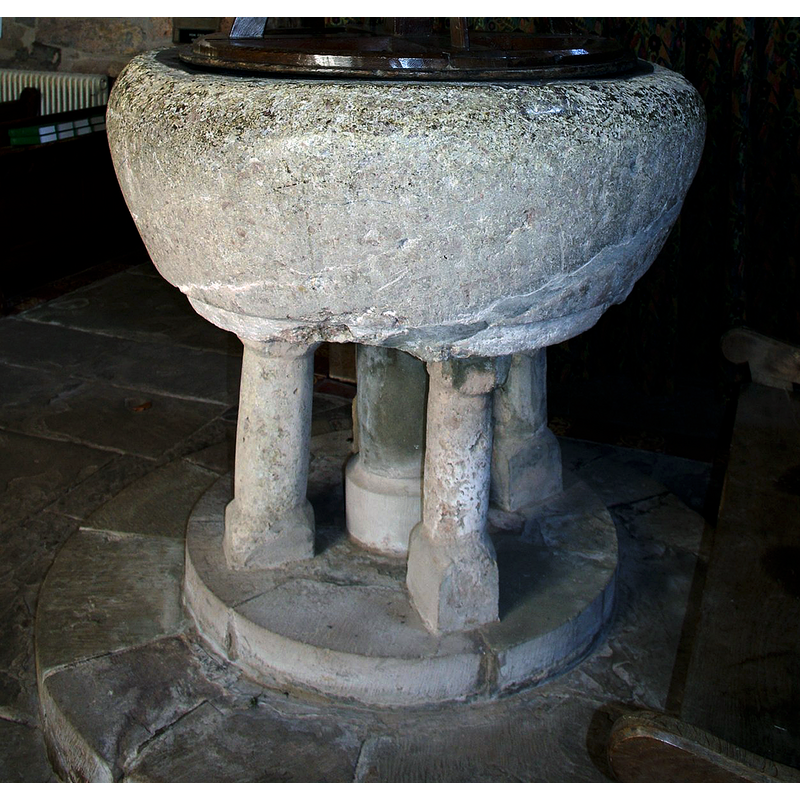
Image copyright © David Merrett, 2011
CC-BY-SA-2.0
Results: 10 records
view of font
Copyright Statement: Image copyright © David Merrett, 2011
Image Source: edited detail of a digital photograph taken 8 April 2011 by David Merrett [www.flickr.com/photos/davehamster/5715934443/] [accessed 21 July 2017]
Copyright Instructions: CC-BY-SA-2.0
view of font and cover
Copyright Statement: Image copyright © John Salmon, 1998
Image Source: photograph taken 12 August 1998 by John Salmon [www.geograph.org.uk/photo/3886570] [accessed 1 May 2015]
Copyright Instructions: CC-BY-SA-2.0
view of church exterior - north portal
Scene Description: Source caption: "Old north doorway at St. Andrew's church, Bredwardine. The carved lintel here is pre-Norman in date and style and features a bird and a grotesque, more probably a sheela na gig."
Copyright Statement: Image copyright © Jeremy Bolwell, 2012
Image Source: digital photograph taken 17 July 2012 by Jeremy Bolwell [www.geograph.org.uk/photo/3043193] [accessed 1 May 2015]
Copyright Instructions: CC-BY-SA-2.0
view of church exterior - south portal
Copyright Statement: Image copyright © John Salmon, 1998
Image Source: photograph taken 12 August 1998 by John Salmon [www.geograph.org.uk/photo/3886562] [accessed 1 May 2015]
Copyright Instructions: CC-BY-SA-2.0
view of church exterior - southwest view
Scene Description: Source caption: "St Andrew, Bredwardine. An ancient church, but the 'Norman' west window dates from the Nicholson restoration of 1875-6, according to the latest edition of Pevsner."
Copyright Statement: Image copyright © Philip Pankhurst, 2012
Image Source: digital photograph taken 19 August 2012 by Philip Pankhurst [www.geograph.org.uk/photo/3091614] [accessed 1 May 2015]
Copyright Instructions: CC-BY-SA-2.0
view of church interior - nave - looking east
Copyright Statement: Image copyright © David Merrett, 2011
Image Source: digital photograph taken 8 April 2011 by David Merrett [www.flickr.com/photos/davehamster/5716497680/] [accessed 21 July 2017]
Copyright Instructions: CC-BY-SA-2.0
view of font and cover in context
Copyright Statement: Image copyright © David Merrett, 2011
Image Source: digital photograph taken 8 April 2011 by David Merrett [www.flickr.com/photos/davehamster/5715934443/] [accessed 21 July 2017]
Copyright Instructions: CC-BY-SA-2.0
view of church interior - nave - looking east
Copyright Statement: Image copyright © John Salmon, 1998
Image Source: photograph taken 12 August 1998 by John Salmon [www.geograph.org.uk/photo/3886563] [accessed 1 May 2015]
Copyright Instructions: CC-BY-SA-2.0
view of font base
Copyright Statement: Image copyright © David Ross & Britain Express Ltd, 2017
Image Source: digital photograph taken by David Ross, in Britain Express Ltd [www.britainexpress.com/images/attractions/editor/Bredwardine-6092.jpg] [accessed 21 July 2017]
Copyright Instructions: Standing permission
view of font and cover in context
Scene Description: in the nave, looking east
Copyright Statement: Image copyright © The Corpus of Romanesque Sculpture in Britain and Ireland, 2015
Image Source: photograph taken 17 March 2005 by Ron Baxter, in the CRSBI [www.crsbi.ac.uk/site/252/] [accessed 1 May 2015]
Copyright Instructions: PERMISSION NOT AVAILABLE -- IMAGE NOT FOR PUBLIC USE
INFORMATION
Font ID: 06786BRE
Object Type: Baptismal Font1
Font Century and Period/Style: 12th century (mid? / late?), Late Norman
Workshop/Group/Artisan: Herefordshire school
Cognate Fonts: The fonts at Kilpeck No. 2 and Mad[e]ley, according to Cox & Harvey (1907); Thurlby (2006) adds Llantilio Crossenny (Gwent/Monmouthshire) as a smaller version of those
Church / Chapel Name: Parish Church of St. Andrew
Font Location in Church: Inside the church, at the W end, S side
Church Patron Saint(s): St. Andrew
Church Address: Church Lane, Bredwardine, County of Herefordshire HR3 6BU
Site Location: Herefordshire, West Midlands, England, United Kingdom
Directions to Site: Located on the B4352, just S of the A438, 18-19 km WNW of Hereford
Ecclesiastic Region: Diocese of Hereford
Historical Region: Hundred of Stradel [in Domesday]
Font Notes:
Click to view
There is an entry for Bredwardine [variant spelling] in the Domesday survey [http://opendomesday.org/place/SO3344/bredwardine/] [accessed 1 May 2015], but it mentions neither cleric nor church in it. A font in this church is recorded in Dineley (aka Dingley, 1868) Listed in Cox & Harvey (1907) as a baptismal font of the Norman period. Described in Halsey (1987) as one of eight baptismal fonts "made of a local reddish brown, psammitic limestone, called 'Breccia' or 'Cornstone'", that were the work of the Herefordshire School [NB: the eight fonts are: Bishops Frome, Bosbury, Bredwardine, Kilpeck, Kingstone, Madley, Turnastone and Vowchurch] [cf. infra for an additional one suggested by Thurlby]. It is round shaped and raised on a columnar base, the latter consisting of a broaf central shaft and "four corner legs, of about 5" diameter, are made of one piece of stone incorporating the capital, shaft and base [...] capitals and bases that are almost interchangeable and similar to cushion capitals". Halsey (ibid.) dates the font to the middle of the 12th century. Herefordshire (1931-1934) identifies the stone as breccia and dates the font to the late 12th century; it describes the font cover as "of oak with central turned post and pierced terminal and four curved struts, 17th century." Described and illustrated in the CRSBI (2015) with likely date "in the third quarter of the 12thc". Thurlby (2006) adds Llantilio Crossenny (Gwent / Monmouthshire) as a smaller version of this group. [NB: the diameter of the Bredwardine font, calculated from a circumference of 3.76 m as given in the CRSBI [cf. measurements] is 119.68 cm; the diameter of the Kilpeck font, which is almost identical otherwise, is only 107 cm]
COORDINATES
UTM: 30U 501810 5771584
Latitude & Longitude (Decimal): 52.094816, -2.973583
Latitude & Longitude (DMS): 52° 5′ 41.34″ N, 2° 58′ 24.9″ W
MEDIUM AND MEASUREMENTS
Material: stone, limestone (psammitic limestone / breccia)
Font Shape: round, mounted
Basin Interior Shape: round
Basin Exterior Shape: round
Diameter (includes rim): 119.68 cm [calculated from CRSBI diameter of 3.76 m.]
Basin Total Height: 50 cm*
Height of Base: 55 cm [calculated]
Font Height (less Plinth): 105 cm*
Notes on Measurements: * CRSBI (2015)
LID INFORMATION
Date: 17th century?
Material: wood, oak
Apparatus: no
Notes: [cf. FontNotes]
REFERENCES
- Corpus of Romanesque Sculpture in Britain and Ireland, The Corpus of Romanesque Sculpture in Britain and Ireland, The Corpus of Romanesque Sculpture in Britain and Ireland. URL: http://www.crsbi.ac.uk.
- Cox, John Charles, English Church Furniture, New York: E.P. Dutton & Co., 1907, p. 201
- Dineley [Dingley], Thomas, History from marble, [London?]: Printed for the Camden Society, 1867-, vol. 2: 99
- Great Britain. Royal Commission on Historical Monuments (England), An Inventory of the Historical Monuments in Herefordshire, London: H.M. Stationary Office, 1931-1934, vol. I: p. xlii, 26
- Halsey, Richard, "Eight Herefordshire marble fonts", Romanesque and Gothic: Essays for George Zarnecki, Woodbridge, Suffolk: Boydell, 1987, p. 107-109
- Thurlby, Malcolm, Romanesque architecture and sculpture in Wales, Little Logaston, Woonton, Almeley, Herts.: Logaston Press, 2006, p. 172
